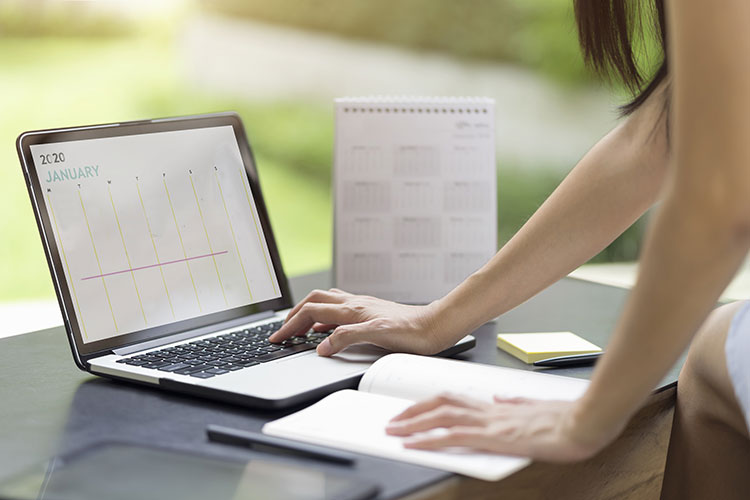If it is your first time to prepare and file a tax return, you may have several unanswered questions, or the task may simply be a little too daunting. Even for seasoned veteran tax preparers, gathering and necessary documents for every tax year can seem like an uphill battle, and procrastination just makes it even worse. Luckily, there is no need to worry because this guide was prepared for you to prepare early for tax time and you will not have to dread this time of the year like many other people who do not take the time to prepare.
Keep a Calendar Handy
During tax time, your calendar is your best friend. To get started, the first thing you have to do is keep tabs on all tax season deadlines. Doing this can be as simple as adding a reminder or email notification before July 1. This date is significant because it’s the first day that you can submit your tax return for the previous financial year to the Australian Taxation Office (ATO). The ATO also permits those leaving Australia before the income year to lodge their tax return early.
You can also visit the ATO website to check lodgment due dates. These dates do change from year to year, so you must stay updated not to miss anything. You do not want to go to the hassle of giving a reason why your tax lodgment was delayed when you spent the entire year doing early preparation.
Keep Essential Documents Handy
When preparing early for tax time, there are a few items you will need to prepare so that you are not scrambling to find them or delaying filing because some essential elements are missing. You will be amazed at the number of people who lack a critical piece of information needed to make a tax return. Therefore, make sure to have these items on hand easy preparation:
- Personal identification
- Medicare card or number
- Australian financial institution account details
- Spouse details including details of income
- Private health insurance information
Eligibility to Lodge an Early Tax Return
The ATO only accepts early lodgment of tax returns for individuals before the end of the financial year under the following conditions:
You are a foreign resident, and you are:
- Will no longer derive an income that is Australian-sourced (other than royalty income, dividends, or interest income)
- Leaving Australia permanently
An Australian resident for tax purposes and you are:
- Ceasing to be an Australian resident for tax reasons
- Leaving Australia
- Will no longer derive an income that is Australian-sourced (other than royalty income, dividends, or interest income)
- If you have a Trade Support Loan (TSL) or Higher Education Loan Program (HELP) debt, you will be required to Lodge your tax return during the standard lodgment period.

Knowing What to Claim to Prepare Early
If you intend to prepare early for tax time, you will need to understand what work-related expenses that you have paid during the financial year can be claimed on your tax return. For students and graduates who are employed, these expenses can include:
- Phone bills for work-related calls
- Uniforms
- Professional development courses
- Professional subscriptions
- Some types of charitable donations
It is not a good idea to assume that you know what can be claimed on your tax return. You should take the time to double-check for information on the ATO website and seek the advice of an accountant or tax preparer to make sure that you have not missed anything since guidelines can change each year.
No Need to Manage a Disorganised Pile of Receipts
When you have a big pile of receipts in a shoebox or folder, it can be a massive headache to go through a year’s worth of expenses when your collection of documents is disorganised. To prevent this problem, you should file all of your payslips and receipts in one designated place as soon as you get them. Maintain consistency throughout the year so that you don’t lose anything and it will be a lot easier to find what you’re looking for when July comes around.
Instead of waiting to file your documents in doing it as soon as you receive them, you eliminate all the worries, and most importantly, you will help yourself save a lot of time. There are many methods you can choose from to store your documents. A digital folder can be a considerable help versus using a more cumbersome physical filing system. There are many ways to do this whether you are using an app on your smartphone, collecting documents on a USB drive, or storing them in the cloud so they can be shared with an accountant during tax time.

Get the Right Support
Whenever you run across a tax related problem or get stuck on how to lodge your tax return, you should know who to turn to get the best professional advice. Do not just speak to any account but instead find one that has specific experience as a tax preparer. Taking this step will help you become more knowledgeable, going forward, and you will be able to navigate the tax system very quickly.
When it comes to registered tax agents, they also can do the tax return for you. If you are preparing early for tax time, this person will give you a significant advantage. You should also not forget that your accountant’s fees may also be tax-deductible so you can also claim that money back on the tax return you prepare for the following year.
How to Lodge an Early Tax Return
Remember that first, you must check to make sure that you meet the eligibility requirements mentioned above. If you meet the requirements, follow these steps if you plan on doing it yourself:
- Refer to the current year’s tax return instructions on the ATO website.
- Get a payment summary from each of your employers as well as details of any other income you earned in Australia. Payslips are not sufficient because they do not always include details of the final payment.
- If your employer is reporting to ATO through Single Touch Payroll, you may not receive a payment summary from your employer. All of this information will be available in the form of an income statement you visit myGov online.
- Contact the ATO to inquire about general requirements such as the early lodgment of tax returns and any outstanding debts that you may have to pay before filing.
- Make sure to take note of any legislative changes that may affect your circumstances when taking early steps to prepare your tax return.
- Once tax time is approaching, be prepared to complete your tax return for individuals and mark the relevant year in bold on the front of your tax return.
- Post your completed tax return to the Australian Taxation Office.
Take note that the service standard is 50 days for processing early lodgments and your assessment will be mailed to the postal address that you write on your tax return. It is also possible to qualify for priority processing if you are suffering from financial hardship.
Start Working on Your Claim Today
Follow these tips to help maximise your next tax deduction, and it starts by keeping good records. By doing so, you can see a bigger return on your future tax claim. The easiest way to maintain records is to take a picture of all receipts with your smartphone or use an app to store them conveniently. You want to make the process as easy as possible, so when the end of the income year rolls around, you will already be prepared to lodge your tax return early.
Once you feel you are ready to lodge your tax return, make sure you use the experts at TaxReturn.com.au, we can help you make the most of your tax return and take the stress out of the process.


